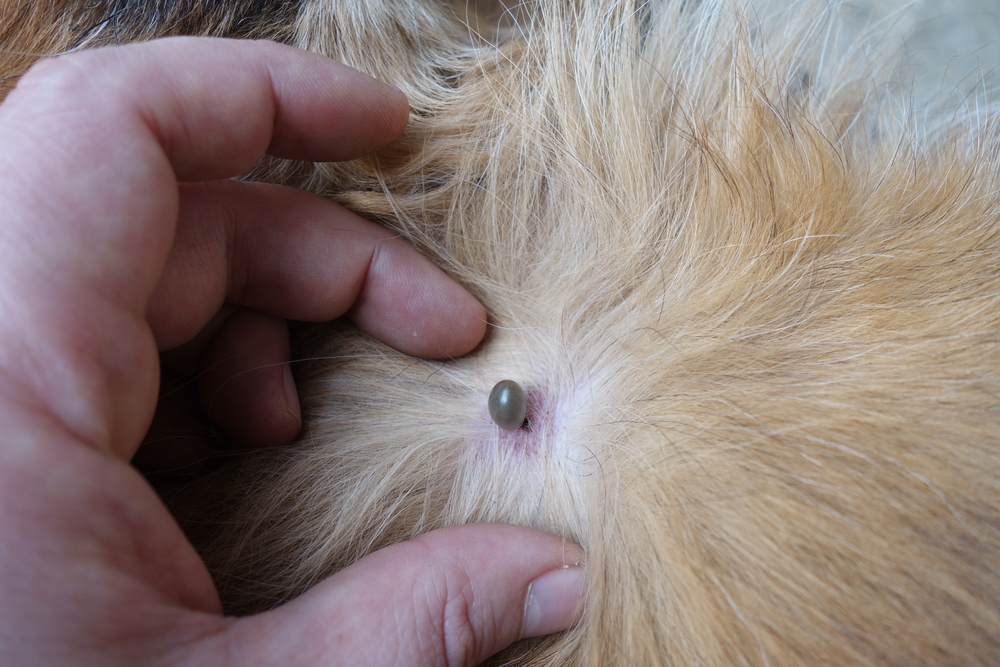If you’ve ever found a flea or tick on your pet, you likely reacted with fright, disgust, or panic, and for good reason. Parasites are not only unpleasant, but can also carry harmful diseases capable of affecting your family members, furry or not. Get the 411 on these pesky creatures by learning what parasites can affect your pets, and why year-round treatment is important.
What is a parasite?
A parasite can be defined as “an organism living in, with, or on another organism.” Typically, the parasite benefits from this relationship, while the host (i.e., the organism associated with the parasite) is harmed in some way. Parasitic relationships exist all over the animal and plant kingdoms, and include a variety of organisms, such as protozoa or insects.
What parasites affect pets?
Pets are susceptible to myriad bugs that can live internally (i.e., inside the body) or externally (i.e., outside the body), causing harm in a variety of ways. Many are simply a nuisance, while others are capable of transmitting harmful diseases. Some of the more common parasites in pets and conditions they may carry include:
- Fleas — Fleas are tiny, external, blood-sucking parasites that can transmit tapeworms. They replicate extremely quickly, causing rapid infestations that can be difficult to eliminate.
- Ticks — Small, external, blood-sucking parasites, ticks carry a variety of diseases including Lyme disease, Rocky Mountain spotted fever, anaplasmosis, and ehrlichiosis.
- Mosquitoes — These small, external, blood-sucking parasites can transmit heartworm disease.
- Mites — Mites are small arachnids that burrow under the skin, but rarely transmit disease.
- Intestinal parasites — These parasites, which include nematodes and protozoa, rarely transmit other diseases, but alone can cause significant disease. Examples include roundworms, hookworms, and giardia.
What are parasite signs in pets?
Pets infected with internal or external parasites may exhibit primary signs associated with the parasite itself, or due to secondary disease. External parasites prefer to live under the fur, next to your pet’s warm skin, so routinely checking these areas can help you catch tiny bugs before they become a big problem. Other signs to monitor include:
- Patchy hair loss, itching, flaky skin, or skin redness
- Abnormal skin lesions
- Ear scratching, head shaking, or dark brown material in the ears
- Vomiting, diarrhea, or blood in the feces
- Inappetence, joint swelling, fever, or lameness
If your pet shows any of these signs, contact Palisades Veterinary Hospital immediately.
Who is at risk?
Any domestic pet is at risk for external or internal parasites. Pets who spend more time outdoors may be more susceptible, but indoor cats can also contract fleas, ear mites, or intestinal worms—never underestimate the power of parasites. While many of these bugs prefer pets’ warm, protective fur coats, people can also suffer from parasitic problems, especially children. These include intestinal parasites such as tapeworms and Giardia, tick-borne diseases, and toxoplasma. Ensure the entire family stays parasite-free by:
- Promptly and hygienically removing pet waste
- Doing nightly “tick checks” on all people and pets
- Ensuring that sandboxes and other play enclosures have lids, and are secured each evening
How are parasites treated?
If your pet develops clinical signs associated with parasites, your Palisades Veterinary Hospital veterinarian will suggest the appropriate diagnostic and treatment plan. This may involve skin or fecal testing, bloodwork, anti-parasitic drugs, and other therapies to reduce signs. In some cases, treating the patient is only part of the problem, since large flea infestations often require home treatment as well, including frequent vacuuming, washing bedding and furniture, and using insecticide products. Because some parasites are so contagious, other pets in the home may also require a workup and treatment.
What type of parasite preventive should I give my pet?

An exceptional variety of parasite preventive products is available, including collars, topical liquids, and chewable tablets. Many provide broad-spectrum coverage for virtually all parasites, while others provide selective coverage. We recommend that prevention for all pets include protection against heartworm, fleas, ticks, and intestinal parasites. While plenty of over-the-counter products are available, they typically do not address heartworm disease, which requires a veterinary prescription.
Contrary to popular belief, parasites can cause problems year-round, especially in Arizona’s mild, desert climate. Our veterinary team can help you choose the best product for your individual pet. Contact us for guidance, or to set up an appointment for your pet.








Leave A Comment